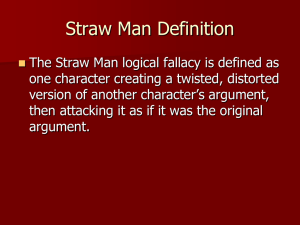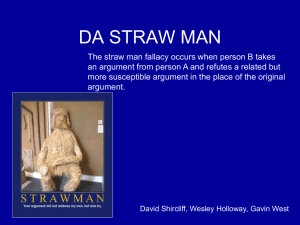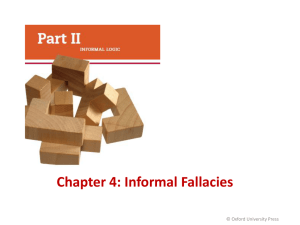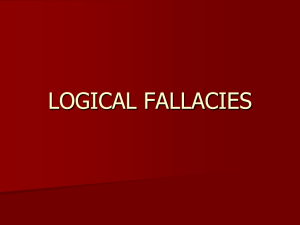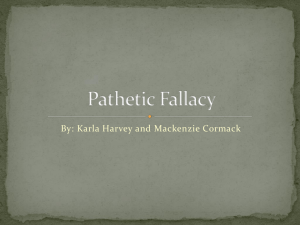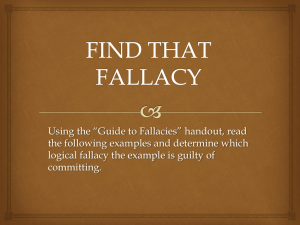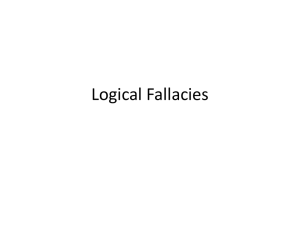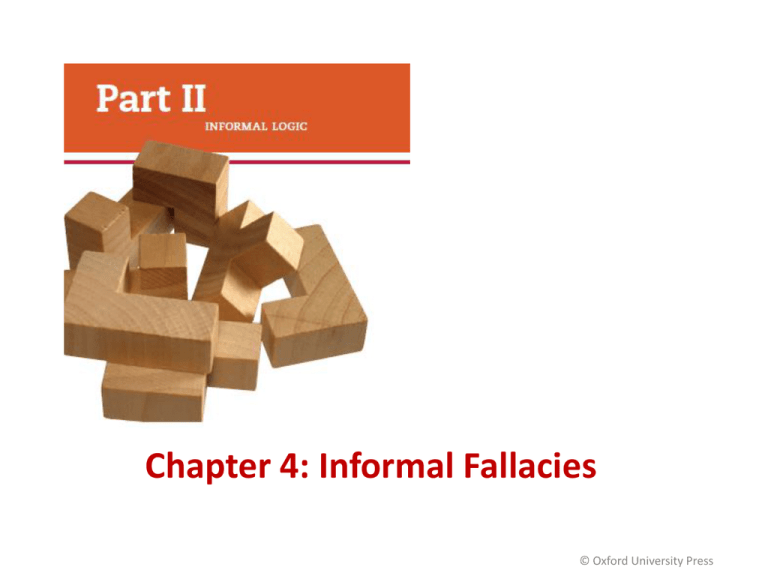
Chapter 4: Informal Fallacies
© Oxford University Press
In This Chapter
A.
B.
C.
D.
Fallacies of Relevance
Fallacies of Unwarranted Assumption
Fallacies of Ambiguity or Diversion
Recognizing Fallacies in Ordinary Language
© Oxford University Press
Fallacies of Ambiguity or Diversion
A fallacy that occurs when
the meanings of terms or
phrases are changed
(intentionally or
unintentionally) within the
argument, or when our
attention is purposely (or
accidentally) diverted from
the issue at hand.
21. Equivocation
22. Amphiboly
23. Composition
24. Division
25. Emphasis
26. Straw Man Fallacy
27. Red Herring Fallacy
© Oxford University Press
Equivocation
The intentional or unintentional use of different
meanings of words or phrases in an argument.
My older brother tries hard to be cool. I told him he has the
personality of a cucumber. Since a refrigerator is a good
place to keep things cool, he should spend some time there.
Equivocation on “cool”: different meanings require the
context of particular sentences for clarity.
© Oxford University Press
Examples:
Some triangles are obtuse. Whatever is obtuse is ignorant. Therefore, some
triangles are ignorant.
Any law can be repealed by the legislative authority. But the law of gravity is a
law. Therefore, the law of gravity can be repealed by legislative authority.
A mouse is an animal. Therefore, a large mouse is a large animal.
We have a duty to do what is right. We have a right to speak out in defense of
the innocent. Therefore have a duty to speak out in defense of the innocent.
© Oxford University Press
Amphiboly
Ambiguity that arises when a poorly constructed
statement muddles the intended meaning.
– He was shot in the train in the back in the sleeping car.
(Was he shot in back or in the back of the train?)
– She watched the monkey eating a banana.
(Who was eating the banana?)
-- Sipping on a cup of cold coffee, the corpse lay in front of
the tired detective.
-- Cursing his bad luck, the DVD player refused to work for
Eddie.
© Oxford University Press
The amphiboly comes when the listener draws a probably mistaken
conclusion from the ambiguous statement. Concluding that the corpse was
enjoying the coffee, for example, would be an amphiboly.
Examples:
The tour guide said that standing in Greenwich Village, the Empire State
Building could easily be seen. It follows that the Empire State Building is in
Greenwich Village.
John told Henry that he had made a mistake. It follows that John has at least
the courage to admit his own mistakes.
Professor Johnson said that he will give a lecture about heart failure in the
biology lecture hall. It must be the case that a number of heart failures have
occurred there recently.
© Oxford University Press
Amphiboly can cause serious problems for contracts and wills. Consider:
Mrs. Hart said in her will, “I will leave my 500-carat diamond necklace and my
pet ferret to Alice and Theresa.” Therefore, we conclude that Alice gets the
necklace and Theresa gets the ferret.
Mr. James signed a contract that reads, “In exchange for painting my house, I
promise to pay David $5000 and give him my new Cadillac only if he finished
the job by May 1.” Therefore, since David did not finish until May 10, it follows
that he gets neither the $5000 nor the Cadillac.
Note: Equivocation is always traced to an ambiguity in the meaning of a word
or phrase. Amphiboly involves a syntactical ambiguity in a statement.
The Great Western Cookbook recommends that we serve the oysters when
thoroughly stewed. Apparently the delicate flavor is enhanced by the
intoxicated condition of the diners.
© Oxford University Press
Composition
Is committed when the conclusion of an argument
depends on the erroneous transfer of an attribute from
the parts of something onto the whole.
– All the cells in his body are tiny. Thus, he is tiny.
– The bricks in this building are sturdy, so the building must
be sturdy.
Compare:
– Every thread of material of which this shirt is composed is
red, so the shirt is red. (Not a fallacy)
© Oxford University Press
Other examples:
Maria likes anchovies. She also likes chocolate ice cream. Therefore, she would
like a chocolate sundae topped with anchovies.
Each player on this basketball team is an excellent athlete. Therefore the team
as a whole is excellent.
Each atom in this teacup is invisible. Therefore, this teacup is invisible.
Sodium and chlorine, the atomic components of salt, are both deadly poisons.
Therefore, salt is a deadly poison.
Compare:
Every atom in this teacup has mass. Therefore, this teacup has mass.
© Oxford University Press
Division
The reverse of composition: this is when the
conclusion of an argument depends on the erroneous
transfer of an attribute from whole onto its parts.
– He is huge, so he must have huge cells.
– The cake tastes burnt, so you must have used burnt
ingredients.
Compare:
– That is a wooden chair, so the legs are made of wood.
(Not a fallacy)
© Oxford University Press
Other examples:
Salt is a nonpoisonous compound. Therefore, its component elements, sodium
and chlorine, are nonpoisonous.
The jigsaw puzzle, when assembled is circular in shape. Therefore, each piece
is circular in shape.
The Royal Society is over 300 years old. Professor Thomson is a member of the
Royal Society Therefore, Professor Thomson is over 300 years old.
Compare:
This teacup has mass. Therefore, the atoms that compose this teacup have
mass.
This field of poppies is uniformly orange. Therefore, the individual poppies are
orange.
© Oxford University Press
Composition, Division, Hasty Generalization, and Accident
• First, determine whether the argument moves from particular to general
or from general to particular.
• If the argument moves from part/specific to whole/general, then the
appropriate fallacy is either that of composition or of hasty generalization.
The fallacy of composition always moves from part to whole, while hasty
generalization moves from specific to general.
• Then, to determine which fallacy applies, look at the conclusion. If the
conclusion is a general (or distributive) statement, that is, if the attribute
in question is being said to be true of each and every member of the class,
then the fallacy is hasty generalization. If the statement is about the
whole (class or collective), that is, if the attribute is said to be true
collectively of a class as a whole, then the fallacy is composition.
• example: Each player on the basketball team is an excellent athlete.
Therefore, the team as a whole is excellent.
• The above example commits the fallacy of composition. The conclusion
does not point to each and every player, but rather to the team/class as a
whole.
© Oxford University Press
•
example: My brother's Ford threw a rod after only 25,000 miles. My
cousin's Ford dropped its transmission when it was only six months old.
Therefore, the Ford Motor Company only makes cars that are piles of junk.
• This example is a hasty generalization, as the conclusion is making the
claim that each and every car made by the Ford Motor Company is a piece
of junk. For this to fit the model for the fallacy of composition, the claim
would have to be that the Ford Motor Company itself is a piece of junk.
• If, on the other hand the argument moves from the general/whole to the
specific/part, then the applicable fallacy will either be that of accident or
division. Division always moves from whole to part while accident moves
from general rule to specific case.
• To determine whether the fallacy is division or accident, begin by looking
at the premises. If the premises contain a general statement, then the
fallacy is accident. That is, if what the premise asserts can be said of each
and every member of the class, the appropriate fallacy is accident. If, on
the other hand, the premise contains a class statement, then the fallacy is
division. That is, if what the premise asserts can only be said of the class
as a whole (that is, if it wouldn't make sense to apply it to all of the
individual members of the class), then the fallacy is division.
© Oxford University Press
• example: Freedom of speech is guaranteed by the U.S. Constitution.
Therefore, Joe should not be punished for yelling "Fire" last night in the
crowded theater.
• The relevant fallacy in the above argument is accident, as the right to free
speech mentioned in the premise is applicable to each and every
individual who falls under the protection of the constitution.
• example: The average American family has 2.5 children. The Jones family
is an average American family. Therefore, the Jones family has 2.5
children.
• This argument commits the fallacy of division as having 2.5 children
cannot be said of each and every American family. (Have you ever seen
half a child?) Rather, the statement is one that is only applicable to the
class as a whole, and not to each of the individual members.
© Oxford University Press
Emphasis
Occurs when attention is purposely (or accidentally)
diverted from the issue at hand.
Jenn: He did win an Academy Award for best actor.
Jess: You might think he did, but you’re wrong.
Jenn: I don’t think, I know.
Jess: I don’t think you know either.
Jess twists the meaning of a key phrase by changing the
emphasis of Jenn’s claim (I don’t think, I know), thus refuting
Jenn’s claim of knowledge (I don’t think you know).
© Oxford University Press
Straw Man Fallacy
Occurs when someone’s argument is distorted for the purpose
of more easily attacking it, and then concluding that the
opponent’s real argument has been demolished (a straw man is
easily knocked down).
Opponent’s position:
She is against the new law that mandates teaching
intelligent design alongside the theory of evolution.
The distortion:
It should be obvious to anyone that she really wants to
eliminate religious beliefs. She wants us to destroy one of
the basics principles of the Constitution of the United States.
© Oxford University Press
More examples:
Mr. Goldberg has argued against prayer in the public schools. Obviously Mr.
Goldberg advocates atheism. But atheism is what they used to have in Russia.
Atheism leads to the suppression of all religions and the replacement of God
by an omnipotent state. Is that we want for this country? I hardly think so.
Clearly, Mr. Goldberg’s argument is nonsense.
The garment workers have signed a petition arguing for better ventilation on
the work premises. Unfortunately, air conditioning is expensive. Air ducts
would have to be run throughout the factory, and a massive heat exchange
unit installed on the roof. Also, the cost of operating such a system during the
summer would be astronomical. In view of all this, the petition must be denied
The student status committee has presented us with an argument favoring
alcohol privileges on campus. What do the students want? Is it their intention
to stay drunk from the day they enter as freshmen until the day they
graduate? Do they expect us to open a bar for them? Or maybe a chain of
bars all over campus. Their proposal is ridiculous!
© Oxford University Press
Red Herring Fallacy
Occurs when someone diverts the attention of the reader or
listener by changing the subject to a different but sometimes
subtly related one.
Opponent’s position:
Many people criticize TV as turning America into an illiterate
society.
The diversion:
How can we criticize the very medium that is the envy of
countries all over the world? The entertainment quality and
variety of TV programs today is greater than ever before,
not to mention the enormous number of cable options
available to members of the viewing audience.
© Oxford University Press
More examples:
Environmentalists are continually harping about the dangers of nuclear power.
Unfortunately, electricity is dangerous no matter where it comes from. Every
year, hundreds of people are electrocuted by accident. Since most of these
accidents are caused by carelessness, they could be avoided if people just
exercise greater caution.
There is a good deal of talk these days about the need to eliminate pesticides
from our fruits and vegetables. But many of these foods are essential to our
health. Carrots are an excellent source of vitamin A, broccoli is rich in iron, and
oranges and grapefruit have lots of vitamin C.
Professor Conway complains about new curriculum being weak. But, did you
know that last year, Conway carried on torrid love affair with a member of the
English Department? The two used to meet every day for clandestine sex in
the copier room. Apparently they didn’t realize how much you can see through
that fogged glass window. Even the students got an eyeful. Enough said about
Conway.
© Oxford University Press
Red Herring, Straw Man, and Missing the Point
• For the straw man, the arguer begins by distorting the opponent’s
argument and concludes by knocking down the distorted argument.
• For the red herring, the arguer ignores the opponent’s argument (if there
is one) and subtly changes the subject.
• Thus, to distinguish them, you should attempt to determine whether the
arguer has knocked down a distorted argument or changed the subject.
• These two can be confused with missing the point. Note that red herring
and straw man both proceed by generating a new set of premises,
whereas missing the point does not. Straw man draws a conclusion from
the new premises coming from the distortion, while red herring, if it draws
a conclusion at all, draws one from new premises obtained by changing
the subject. Missing the point, however, draws its conclusion from the
original premises. Also, for red herring and straw man, the conclusion IS
relevant to the premises from which it’s drawn; in missing the point, the
conclusion is irrelevant to the premises from which it’s drawn.
© Oxford University Press
Check Your Understanding 4C
• Example I
In an Amphiboly, an attribute of an object as a whole is
mistakenly transferred to its individual parts.
– Answer
False
• Example II
Alix said the students in her government class should take the
idea of a benevolent dictator seriously. Basically she’s saying
that people should resign themselves to having no personal
liberties at all, for the good of everyone else.
– Answer
Straw Man fallacy
© Oxford University Press

